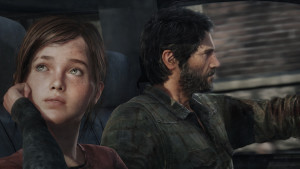 A few weeks ago, I wrote about the gendered labor that’s represented in The Last of Us, and since then, I’ve been thinking a lot more about the implications of the game’s representation of gendered family structures. Gerald Voorhees talks about The Last of Us’s representation of “paternal masculinity” as being representative of “the dadification of games.” But Voorhees argues that the “dadification” of The Last of Us does not champion “a conception of the father-daughter relationship that re-entrenches the most pathological and misogynist elements of patriarchal domination” but rather “refigures the paternal role in ways that trouble the touchstones of traditional patriarchy.”
A few weeks ago, I wrote about the gendered labor that’s represented in The Last of Us, and since then, I’ve been thinking a lot more about the implications of the game’s representation of gendered family structures. Gerald Voorhees talks about The Last of Us’s representation of “paternal masculinity” as being representative of “the dadification of games.” But Voorhees argues that the “dadification” of The Last of Us does not champion “a conception of the father-daughter relationship that re-entrenches the most pathological and misogynist elements of patriarchal domination” but rather “refigures the paternal role in ways that trouble the touchstones of traditional patriarchy.”
In Of Woman Born, Adrienne Rich defines patriarchy as “the power of the fathers,” and this power is manifested through systems of power—be they political, ideological, familial, social—that subjugate women in a multitude of ways (through force, through customs, through tradition, through language, through labor, through law). This is what Rich refers to as the “Kingdom of the Fathers”—a system of power that permeates everything, especially the ways the idea of the family unit come to be conceived. Such a family unit is implicated in The Last of Us, and as a result, I have a hard time seeing the game, as Voorhees does, as one that troubles “the touchstones of traditional patriarchy.”
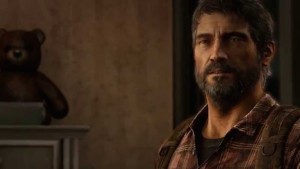 Joel’s role as a father is established in the opening sequence through his relationship with his young daughter Sarah. Indeed, the closeness of Joel’s relationship with his daughter seems to be meant to cause, as Maddy Myers puts it, “people to empathize with the kind of fatherhood that The Last of Us depicts.” Joel is a single father who works long hours in order to provide for his daughter, and it is this labor that we are meant to see as emblematic of Joel’s love as a parent and his ability to be a good father. And Sarah loves him right back. But Joel’s role as a good father is called into question almost immediately, for in the next series of scenes, the zombie apocalypse has begun, and Joel’s brother Tommy has come to pick up Joel and Sarah so they can get out of town; as they drive away, they see people on the side of the road, and when Tommy begins to slow down to help them, Joel says, “What the hell do you think you’re doing? Keep driving.” Even though Sarah objects, Joel persists and makes Tommy drive past them because Joel’s mode of fatherhood, Myers argues, is “a self-involved parenting style that, in theory, puts one’s child above everyone else.” Thus, in the case of Joel and Sarah, Joel ascribes to the “father knows best” model of parenting and what Joel says goes because Joel believes that he knows best, especially when it comes to survival.
Joel’s role as a father is established in the opening sequence through his relationship with his young daughter Sarah. Indeed, the closeness of Joel’s relationship with his daughter seems to be meant to cause, as Maddy Myers puts it, “people to empathize with the kind of fatherhood that The Last of Us depicts.” Joel is a single father who works long hours in order to provide for his daughter, and it is this labor that we are meant to see as emblematic of Joel’s love as a parent and his ability to be a good father. And Sarah loves him right back. But Joel’s role as a good father is called into question almost immediately, for in the next series of scenes, the zombie apocalypse has begun, and Joel’s brother Tommy has come to pick up Joel and Sarah so they can get out of town; as they drive away, they see people on the side of the road, and when Tommy begins to slow down to help them, Joel says, “What the hell do you think you’re doing? Keep driving.” Even though Sarah objects, Joel persists and makes Tommy drive past them because Joel’s mode of fatherhood, Myers argues, is “a self-involved parenting style that, in theory, puts one’s child above everyone else.” Thus, in the case of Joel and Sarah, Joel ascribes to the “father knows best” model of parenting and what Joel says goes because Joel believes that he knows best, especially when it comes to survival.
Cut to twenty years later, and this “Joel knows best” model of survival still holds strong in the ways he interacts with Ellie. Joel initially approaches his relationship with Ellie as simply part of the “job” (because that is what the care of a young girl has now become to Joel—a job), as a temporary state, one that he needs to finish as quickly as possible, and the temporary nature of this “job” is highlighted through the manner in which Bill, while helping Joel and Ellie escape the city, refers to Joel’s situation as one of babysitting: “You keep babysitting long enough and eventually it’s gonna blow up in your face.” As the game progresses, Joel’s relationship with Ellie does grow, though, and his perspective on this relationship begins to shift, but he resists thinking of this relationship as one based on father-daughter ties; at one point, Ellie tells Joel, “Everyone I have cared for has either died or left me. Everyone except for you. So don’t tell me that I would be safer with someone else—because the truth is I’d just be more scared.” Joel, however, responds, “You’re not my daughter, and I sure as hell ain’t your dad. And we are going our separate ways.”
But they do not go their separate ways because Joel comes to realize that he does care about Ellie. And his reasons for caring about her, ultimately, seem tied to the fact that Ellie reminds Joel of Sarah, for in the final scene of the game, Joel says, “Don’t think I ever told you, but Sarah and I used to take hikes like this…I think the two of you would’ve been good friends. I think you really would’ve liked her. I know she would’ve liked you.” Thus, by the end of the game, Joel’s relationship with Ellie does eventually shift from being that of a job, a temporary state of babysitting, to that of a more permanent father-daughter bond, as revealed through the invocation of Sarah in the end—Ellie reminds Joel of his daughter, and Ellie reminds Joel of his role as a father. Ellie, like Sarah, is special.
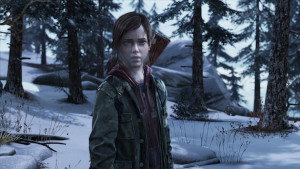 Ellie’s characterization throughout the game is often limited to being framed in one of two ways—she is either this exceptional daughter figure or, as we see when she first meets Joel and Tess, she is objectified cargo to be smuggled. But, often, even when Ellie is seen as more than just cargo, more than just an object to be smuggled, Joel still views her as something to be protected; at one point in a skirmish with a group of scavengers, Ellie disregards Joel’s order to “hang back” and saves him by shooting his assailant, and afterward, Joel asks, “Why didn’t you just hang back like I told you to?…I’m glad I didn’t get my head blown off by a goddamn kid.” Ellie later tries to explain, “I wasn’t trying to disobey you back there. You were taking a really long time and I thought, maybe he’s gotten into trouble.” But Joel dismisses her: “It don’t matter what you thought. I need you to listen to me.” Joel’s dismissal of Ellie’s ability to make such decisions, his dismissal of her agency, not just in this scene but throughout the game, causes Myers to sarcastically point out, “In the case of this game, apparently daughters don’t always know what’s best for them…Good thing their fathers are there to decide for them.”
Ellie’s characterization throughout the game is often limited to being framed in one of two ways—she is either this exceptional daughter figure or, as we see when she first meets Joel and Tess, she is objectified cargo to be smuggled. But, often, even when Ellie is seen as more than just cargo, more than just an object to be smuggled, Joel still views her as something to be protected; at one point in a skirmish with a group of scavengers, Ellie disregards Joel’s order to “hang back” and saves him by shooting his assailant, and afterward, Joel asks, “Why didn’t you just hang back like I told you to?…I’m glad I didn’t get my head blown off by a goddamn kid.” Ellie later tries to explain, “I wasn’t trying to disobey you back there. You were taking a really long time and I thought, maybe he’s gotten into trouble.” But Joel dismisses her: “It don’t matter what you thought. I need you to listen to me.” Joel’s dismissal of Ellie’s ability to make such decisions, his dismissal of her agency, not just in this scene but throughout the game, causes Myers to sarcastically point out, “In the case of this game, apparently daughters don’t always know what’s best for them…Good thing their fathers are there to decide for them.”
Ultimately, Joel does believe that it is up to him to decide for Ellie, a belief that plays a significant role in the manner in which the game ends. When they get to the Fireflies’ medical facility, Joel realized the Fireflies intend to kill Ellie in order to extract her brain for the cure, and instead of asking Ellie what she wants to do, instead of allowing her to make the decision to sacrifice herself to save the world (or to make the decision not to do so), Joel, instead, kills all the Fireflies in his path and “rescues” her just in the knick of time while she is unconscious on the operating table. And when Ellie wakes up, Joel lies to her about what the Fireflies intended, telling her they never had a means for a cure. Thus, as Myers put it, The Last of Us does not “end with Ellie striking out on her own, nor does it even end with her making a decision about her own welfare. The end of The Last of Us involves several adults making a choice about whether Ellie should live or die without asking her opinion on the matter, and as a sort of bonus, they lie to her about what’s at stake both before and after they make this decision about her.” Voorhees too points out that Ellie is “overwhelmingly represented as paternal charge,” for she is consistently denied the ability to make her own choices and act on her own agency. In short, Ellie’s characterization relies primarily on her role as this paternal charge, her role in relation to the father—her role as daughter to Joel.
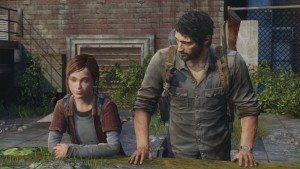 Joel’s role as a father figure to Ellie hinges on the belief that it is up to him to make such decision for her, and such decisions often result in violence and death in the game. Voorhees argues that the game represents fatherhood in a way that perpetuates “hegemonic, militarized masculinity; the father is removed from the obligation to care, and his capacity to do violence is centered.” However, Voorhees also argues that, regardless of this centering of violent, militarized masculinity, The Last of Us still “suggests a more progressive relationship with daughter figures,” one that, he argues, centers on “acceptance of the other’s agency.” Voorhees sees this message of acceptance of daughters’ agency in the game because, even though “Ellie’s display of strength, capability, and loyalty is undertaken in the service of her father, this game as a fable of fatherhood suggests that fathers should have confidence in the actions of their daughter figures…In losing power to Ellie, there is nothing to fear and everything to gain.” However, such an argument does not take into account the manner in which the game ends—for if “there is nothing to fear and everything to gain” in allowing Ellie to assert her agency, if Joel truly has confidence in Ellie’s ability to act and think for herself, then it would seem to me that he would, then, not rob her of this agency by lying to her, by taking her away from the Fireflies, by not allowing her to make this decision for herself. As such, instead of the game telling the story of a father figure allowing his daughter to make decisions for herself in a way that challenges the normative construction of the role of the father as one based on control exerted in the name of “protection,” the game, instead, as Keith Stuart argues, tells the story of a man “coming to terms with violence and the responsibilities of fatherhood…in such a way as to confirm the masculine status quo. Self-sacrifice in combat, ruthless violence, the sanguine acceptance that there is no other way”—that there is no other way than that of the father.
Joel’s role as a father figure to Ellie hinges on the belief that it is up to him to make such decision for her, and such decisions often result in violence and death in the game. Voorhees argues that the game represents fatherhood in a way that perpetuates “hegemonic, militarized masculinity; the father is removed from the obligation to care, and his capacity to do violence is centered.” However, Voorhees also argues that, regardless of this centering of violent, militarized masculinity, The Last of Us still “suggests a more progressive relationship with daughter figures,” one that, he argues, centers on “acceptance of the other’s agency.” Voorhees sees this message of acceptance of daughters’ agency in the game because, even though “Ellie’s display of strength, capability, and loyalty is undertaken in the service of her father, this game as a fable of fatherhood suggests that fathers should have confidence in the actions of their daughter figures…In losing power to Ellie, there is nothing to fear and everything to gain.” However, such an argument does not take into account the manner in which the game ends—for if “there is nothing to fear and everything to gain” in allowing Ellie to assert her agency, if Joel truly has confidence in Ellie’s ability to act and think for herself, then it would seem to me that he would, then, not rob her of this agency by lying to her, by taking her away from the Fireflies, by not allowing her to make this decision for herself. As such, instead of the game telling the story of a father figure allowing his daughter to make decisions for herself in a way that challenges the normative construction of the role of the father as one based on control exerted in the name of “protection,” the game, instead, as Keith Stuart argues, tells the story of a man “coming to terms with violence and the responsibilities of fatherhood…in such a way as to confirm the masculine status quo. Self-sacrifice in combat, ruthless violence, the sanguine acceptance that there is no other way”—that there is no other way than that of the father.
The thing is, The Last of Us isn’t the only game to represent fatherhood and daughterhood in these ways, and as such, I’ve been thinking a lot about how these controlling images get repeated across gaming narratives. As a result, I plan to continue this line of thinking by following this post up with a couple more that continue this examination of the ways “the power of the father” manifests itself in other video games and how such repeated representations speak to the ways gaming narratives serve to perpetuate patriarchal constructions of family and gendered labor.

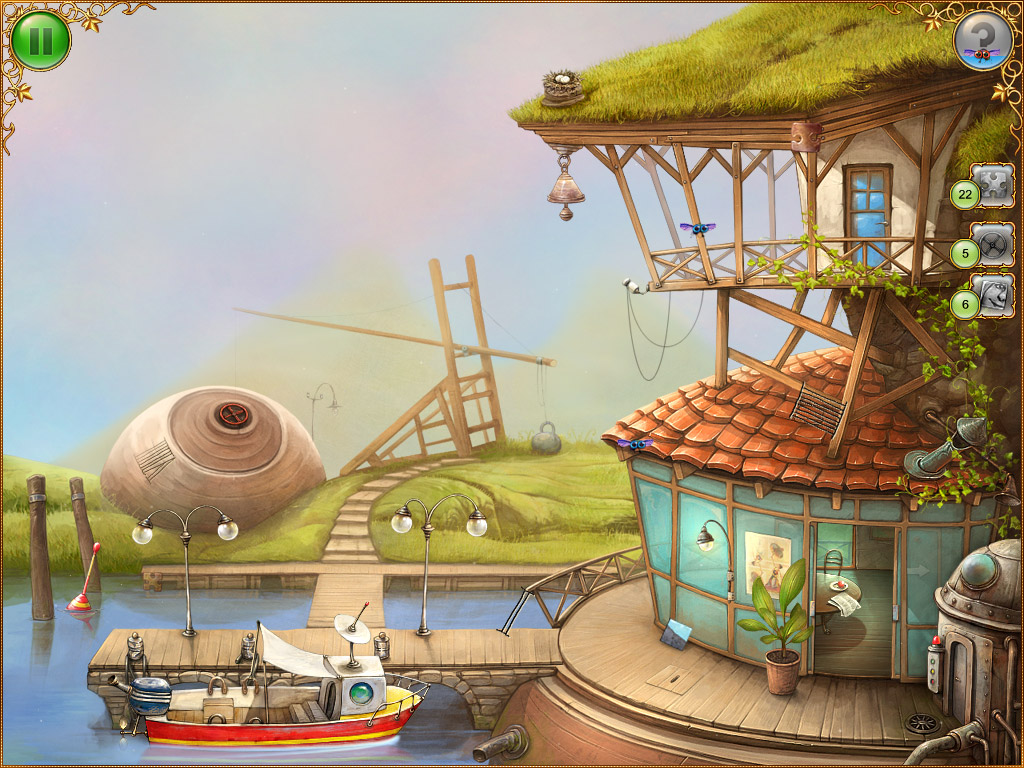



One thought on “The Power of the Fathers: Patriarchal Fatherhood and Oppressed Daughterhood in The Last of Us”
I’m going to be a bit narrative now. I just accepted a place on an MA gender studies course so I’m feeling a little celebratory self-indulgence coming on :D.
I started writing a comment on this piece when it first arrived on the site but then stopped. I was going to write about how I agree with it, how I find it hard to see the redemption of fatherhood in this game. That felt a bit empty, so I decided not to. However, as time went on I kept thinking about it in my off moments when I had nothing else to do…my mind would wander back.
I thought some of these things:
I don’t think Joel’s abandoning of his neighbours does call into question his role as a good father. Rather, it is emblematic of his ‘good father’ role, and of the way in which the heterosexual family isolates people from their communities, turns them into self-contained units to be moved around at the behest of Capital…or zombies (zombies are a weirdly versatile metaphor it seems).
As I interpret your quote of Rich in relation to this game: ultimately Joel is a father figure and he has power, so all acts of fatherhood he commits will shadowed by violence and misogyny (nevermind his explicitly expressed violence :P). The power of fathers is expressed in the power held by fathers. That might be why this particular father can be interpreted as both progressive and traditional (though the progressive view fails to explain his behaviour at the end which has all the hallmarks of the worst patriarchal fatherhood).
I’m reminded of the science writer Donna Haraway and their writing about how we’re missing a trick if we only criticise ‘bad science’ because the existence of ‘bad science’ should call into question the entire structure of science itself. Science, as we know it, allows bad science to exist, after all.
In the same way that a society that allows slavery is not redeemed just because not everybody is enslaved, perhaps the institution of fatherhood (or of the heterosexual family) is not redeemed just because not all fathers are violent monsters? The institution permits the problem, frames it, reproduces it.
The ‘Joel Problem’ may represent the heterosexual family as such….and I don’t have am end for this comment really. Just wanted to add my thoughts as an extension.
I look forward to your continuation of this line of thinking :).